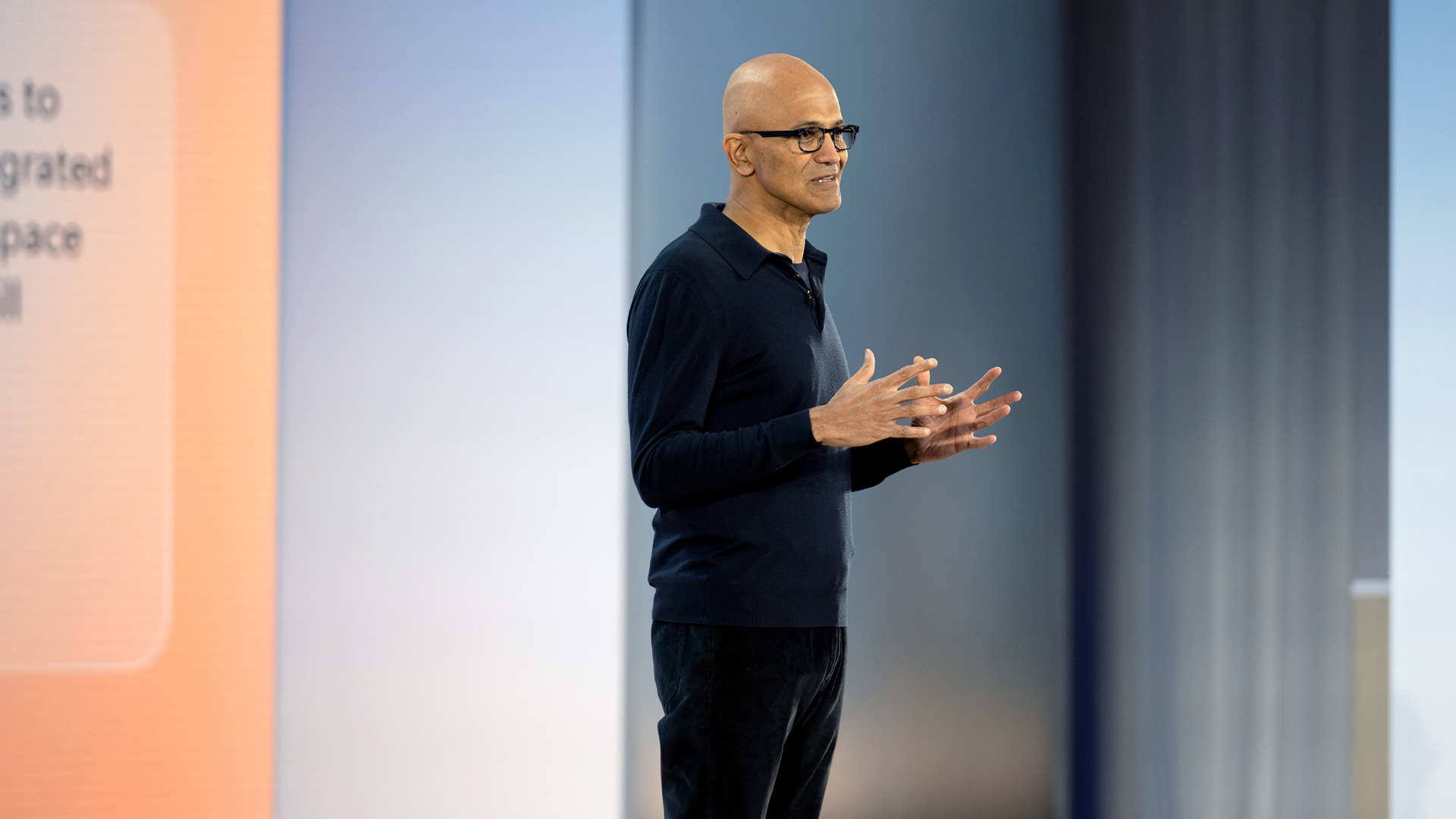‘The entire forecasting business process changed’: Microsoft CEO Satya Nadella says Excel changed the game for enterprises in 1985 – he’s confident AI tools will do the same
The Microsoft CEO says we need to change how we measure the value of AI


AI is yet to have the same transformative impact on business and knowledge work akin to the launch of Excel, according to Microsoft CEO Satya Nadella, but he appears confident a big breakthrough is looming on the horizon.
Speaking on Dwarkesh Patel’s podcast, Nadella harkened back to Microsoft Excel and its impact on financial forecasting in years gone by, which involved the exchange of faxes and hard copies - an often laborious process which, upon reflection, significantly impeded enterprise efficiency.
“Faxes went around, somebody then got those faxes and then did an inter-office memo that then went around and people entered numbers … ultimately, a forecast came, maybe just in time for the next quarter,” Nadella said.
“Then somebody said, ‘hey, I'm just going to take an Excel spreadsheet, put it an email, send it around, people will go edit it, and I'll have a forecast,’” Nadella added.
"So the entire forecasting business process changed because the work, the work artefact and the workflow changed.”
Ultimately, this is what needs to happen with AI being introduced into knowledge work, Nadella noted.
The Microsoft chief exec spoke about how his own work processes have changed as he’s begun to use AI, mentioning that he had even deployed Copilot in preparation for this podcast.
Sign up today and you will receive a free copy of our Future Focus 2025 report - the leading guidance on AI, cybersecurity and other IT challenges as per 700+ senior executives
This shift towards AI becoming a major presence in staff workflows will take time though, he thinks, with management teams and individuals engaged in knowledge work having to gradually shift processes towards AI use.
Changing the metric on AI success
Nadella also focused on how the industry at large is measuring the success of AI, particularly regarding how it impacts the global economy and creates market value.
In particular, he hit out at the industry fixation on achieving artificial general intelligence (AGI), which represents the point at which AI can match or surpass human cognitive capabilities.
Sam Altman, CEO of OpenAI, Microsoft’s leading partner on the technology, has been highly vocal about the company’s work toward achieving this goal in recent years.
“Us self claiming some AGI milestone - that's just nonsensical benchmark hacking to me,” Nadella said.
RELATED WHITEPAPER

Notably, Nadella said the real benchmark for AI’s success is the world growing in economic terms.
The same principle could be applied to AI success within businesses. Firms need to keep their focus on what value AI products are driving within companies and within staff workflows.
Speaking to ITPro, Dom Couldwell, head of field engineering EMEA at DataStax, agreed with this outlook, noting that AI projects should be “judged on the value that they deliver to the business" - be that in terms of a return on investment (ROI) or the additional benefits afforded to individual workers using the tech.
“Without those specific metrics, it is hard to justify the spending and take a project from proof of concept into production, particularly at scale,” he said.
How can businesses get value out of AI?
The most successful AI projects are the ones that begin by focusing on the value side first and then work backward, Couldwell said, rather than those which haphazardly dive into the tech and try to establish a use case via experimentation.
Successful firms look for a ‘Minimal Viable Product (MVP)’ as opposed to over-engineering, he added. This means asking what the minimum level of complexity needed is.
“The added risk around Gen AI projects is that teams are adopting this new tech for the sake of it versus really needing it or having that solid business case in the first place. While there might be demand from the business to be seen to be doing something around AI, taking the time to investigate and test beforehand will pay off,” Couldwell said.
“In terms of how to approach this, my advice with the companies I have worked with would be to pressure test the approach - pick a project that is directly linked to how the business makes more revenue or saves significant costs in order to put together a project, but not an area that is too tied to other processes,” he added.
This process ensures that businesses can build with AI and demonstrate what’s effective before looking at larger projects that can benefit from the lessons learned along the way.
Is AI delivering for businesses?
There are mixed reports from companies as to how effectively AI is delivering value in businesses, though Microsoft itself claimed late last year that generative AI tools offer a return on investment (ROI) of $3.70 for every dollar invested.
The report also claimed that AI deployments take under eight months to roll out, with ROI delivered within 13 months.
Other research has been less positive, though, with research from Appen in October 2024 suggesting that ROI from AI has dropped significantly over the last three years due to data issues.
While 56.7% of AI projects delivered meaningful ROI in 2021, the report found, this figure dropped to 53.5% in 2022 and 51.9% the year after. By 2024, meaningful ROI delivery had sunk to 47.3%.
MORE FROM ITPRO
- AI was touted as a game changer for productivity – but employees are still saddled with growing workloads
- Microsoft exec touts benefits of AI productivity gains
- AI could be the key to solving the UK’s productivity problem

George Fitzmaurice is a former Staff Writer at ITPro and ChannelPro, with a particular interest in AI regulation, data legislation, and market development. After graduating from the University of Oxford with a degree in English Language and Literature, he undertook an internship at the New Statesman before starting at ITPro. Outside of the office, George is both an aspiring musician and an avid reader.
-
 Microsoft unveils Maia 200 accelerator, claiming better performance per dollar than Amazon and Google
Microsoft unveils Maia 200 accelerator, claiming better performance per dollar than Amazon and GoogleNews The launch of Microsoft’s second-generation silicon solidifies its mission to scale AI workloads and directly control more of its infrastructure
-
 Infosys expands Swiss footprint with new Zurich office
Infosys expands Swiss footprint with new Zurich officeNews The firm has relocated its Swiss headquarters to support partners delivering AI-led digital transformation
-
 If Satya Nadella wants us to take AI seriously, let’s forget about mass adoption and start with a return on investment for those already using it
If Satya Nadella wants us to take AI seriously, let’s forget about mass adoption and start with a return on investment for those already using itOpinion The Microsoft chief said there’s a risk public sentiment might sour unless adoption is distributed more evenly
-
 Half of agentic AI projects are still stuck at the pilot stage – but that’s not stopping enterprises from ramping up investment
Half of agentic AI projects are still stuck at the pilot stage – but that’s not stopping enterprises from ramping up investmentNews Organizations are stymied by issues with security, privacy, and compliance, as well as the technical challenges of managing agents at scale
-
 What Anthropic's constitution changes mean for the future of Claude
What Anthropic's constitution changes mean for the future of ClaudeNews The developer debates AI consciousness while trying to make Claude chatbot behave better
-
 Satya Nadella says a 'telltale sign' of an AI bubble is if it only benefits tech companies – but the technology is now having a huge impact in a range of industries
Satya Nadella says a 'telltale sign' of an AI bubble is if it only benefits tech companies – but the technology is now having a huge impact in a range of industriesNews Microsoft CEO Satya Nadella appears confident that the AI market isn’t in the midst of a bubble, but warned widespread adoption outside of the technology industry will be key to calming concerns.
-
 Workers are wasting half a day each week fixing AI ‘workslop’
Workers are wasting half a day each week fixing AI ‘workslop’News Better staff training and understanding of the technology is needed to cut down on AI workslop
-
 Retailers are turning to AI to streamline supply chains and customer experience – and open source options are proving highly popular
Retailers are turning to AI to streamline supply chains and customer experience – and open source options are proving highly popularNews Companies are moving AI projects from pilot to production across the board, with a focus on open-source models and software, as well as agentic and physical AI
-
 Microsoft CEO Satya Nadella wants an end to the term ‘AI slop’ and says 2026 will be a ‘pivotal year’ for the technology – but enterprises still need to iron out key lingering issues
Microsoft CEO Satya Nadella wants an end to the term ‘AI slop’ and says 2026 will be a ‘pivotal year’ for the technology – but enterprises still need to iron out key lingering issuesNews Microsoft CEO Satya Nadella might want the term "AI slop" shelved in 2026, but businesses will still be dealing with increasing output problems and poor returns.
-
 OpenAI says prompt injection attacks are a serious threat for AI browsers – and it’s a problem that’s ‘unlikely to ever be fully solved'
OpenAI says prompt injection attacks are a serious threat for AI browsers – and it’s a problem that’s ‘unlikely to ever be fully solved'News OpenAI details efforts to protect ChatGPT Atlas against prompt injection attacks